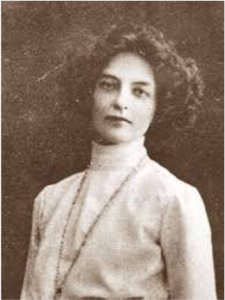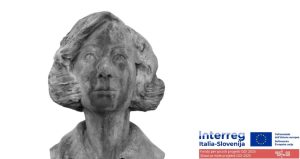Zinaida Gippius (20 November 1869 – 9 September 1945) wrote many novels and articles, and became the founder of several literary salons in Russia and Europe.
She was born in Belyov, where her father worked. After moving to Moscow, Zinaida soon fell ill and moved to Yalta, and then to Tiflis. In 1888, in Borjomi, Gippius met the poet Dmitry Merezhkovsky. A year later they were married. They lived together for 52 years.
In 1889, she and her husband came to Petersburg. Gippius was a harbinger of symbolism that was emerging in Russia at the time; she was elevated to the rank of a “senior symbolist” (decadent). Her name continually appeared on the pages of literary magazines old and new, she published collections of her poems and prose, she would write plays, act as a literary critic. Her house from 1900 until 1910 served as the main literary salon in St. Petersburg. She helped Alexander Blok launch his literary debut, introduced the upstart Osip Mandelstam into literary society, and wrote the first review of the poems of Sergei Yesenin.
Gippius together with her husband opposed autocracy as well as conservatism, and spent more than two years in exile in Paris. In 1908, the couple returned to St. Petersburg. From 1908 to 1912 she published two collections of short stories. She denounced the October Revolution; then in early 1920 the Merezhkovskys emigrated to France.
In 1927, on Gippius’s initiative, a literary and philosophical Sunday society was founded in Paris, which included Ivan Bunin, George Ivanov, Vladislav Khodasevich and other writers from abroad. Dmitry Merezhkovsky died in 1941. When Zinaida Gippius died in 1945, she was buried together with her husband.





